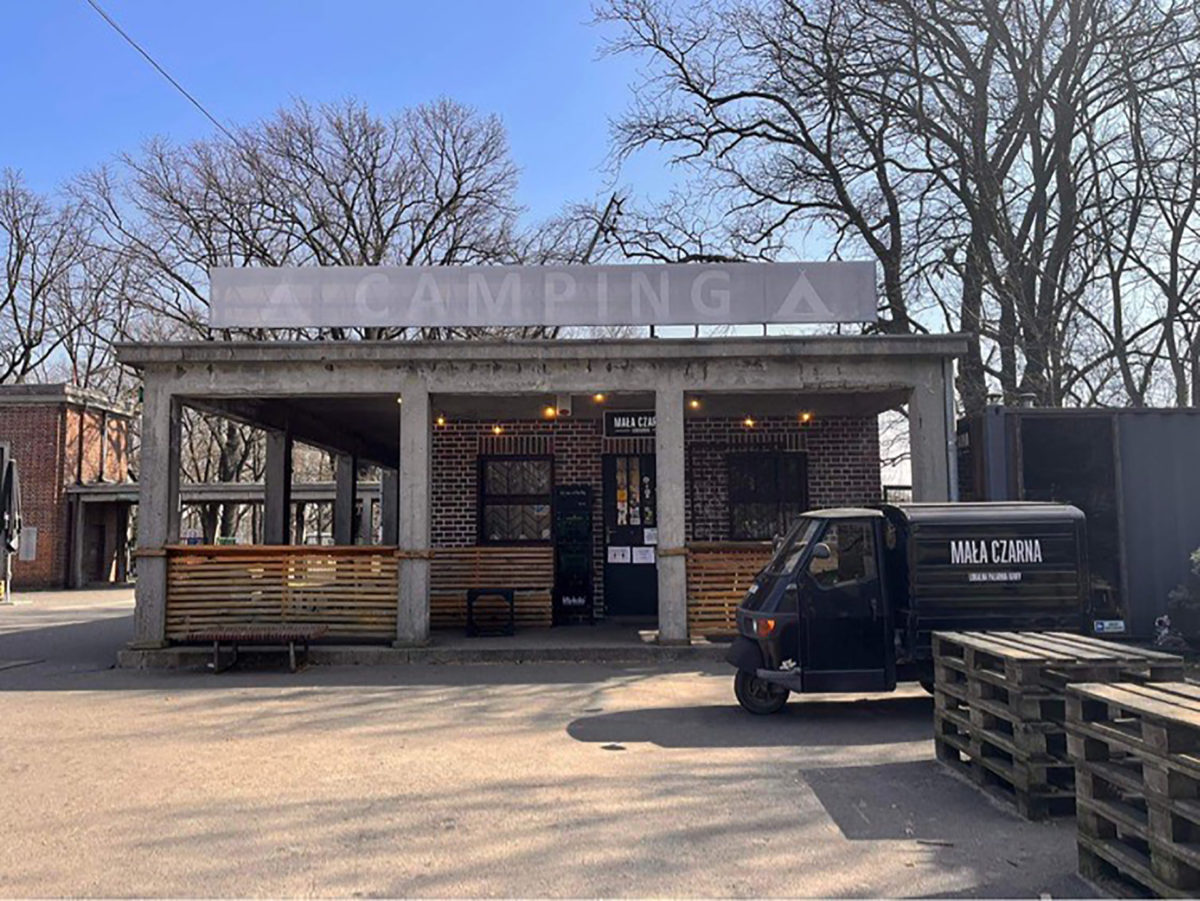Story: Yaroslav Druziuk
March 24th marked the first month of the ongoing full-scale war that Russia waged on Ukraine. The Ukrainians have lost thousands of civilian lives; a number of hospitals, churches, and historic buildings were bombed by the Russian occupying forces.
More than 3.8 million people left Ukraine last month, with 2.2 million fleeing to neighboring Poland as of March 28th. Sprudge’s already told the story of the Ukrainian coffee community at war, and now we tell the stories of Ukrainian baristas finding safe places in Poland.
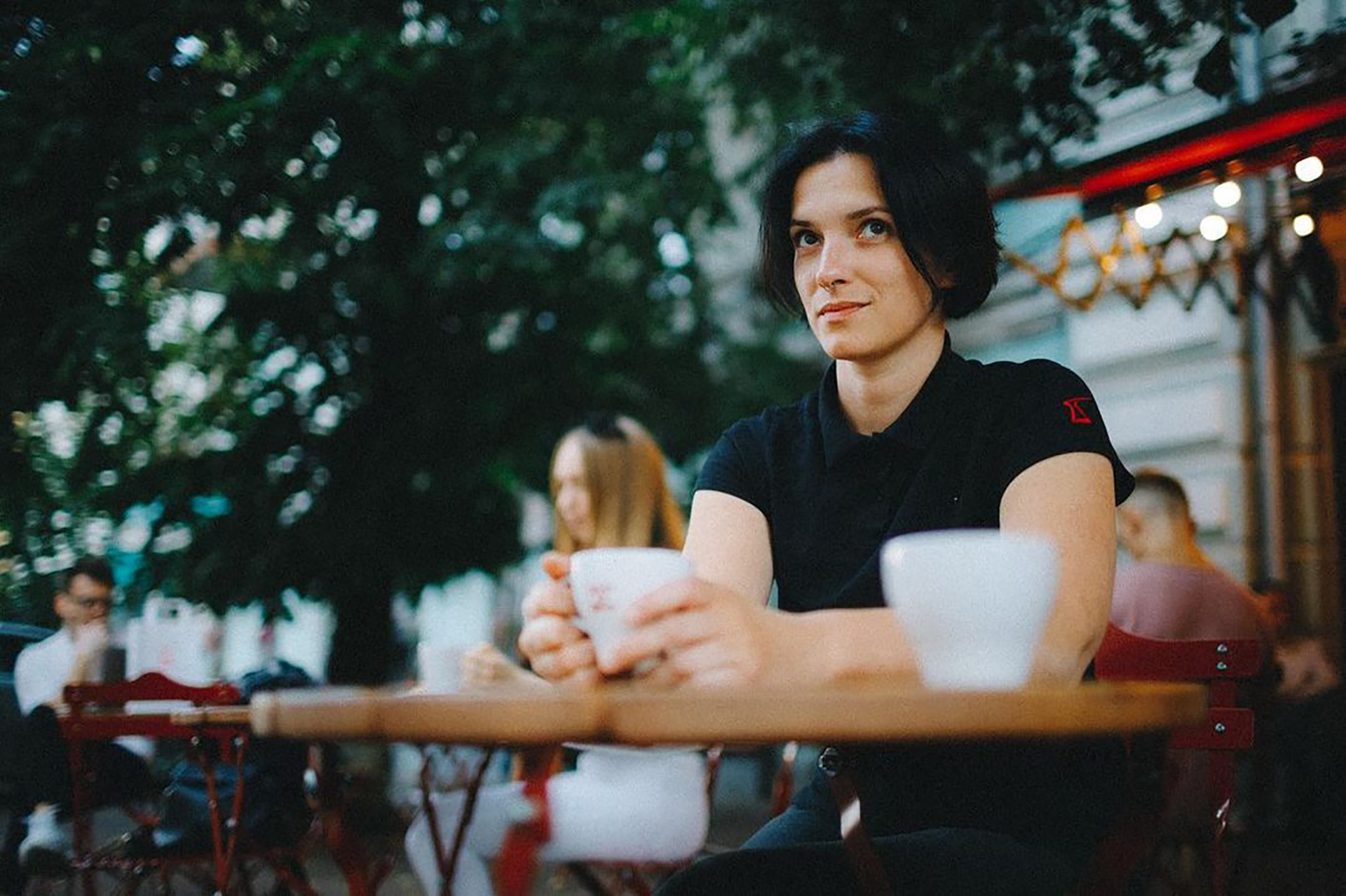
Iren Hryshchenko had a day shift in her Kyiv coffee shop on February 24th. She was supposed to start at Svit Kavy (World of Coffee) at 11:30 but decided to come to work early. She says she just couldn’t stay home, after waking up to the sounds of bombardments and knowing that her country was under attack. “Actually we had a lot of guests that morning, even after our POS software stopped working we decided to treat them. So yeah, that was my last shift after the war started,” Hryshchenko tells me about three weeks later, safe in the city of Wroclaw across the border in Poland.
Hryshchenko’s story is one of many, people forced to flee Kyiv after Vladimir Putin launched a full-scale invasion and Russian missiles began striking the capital city. She and her boyfriend Dima (along with their cat Jah) decided to head for Lviv, a city in the west of Ukraine. Hryshchenko’s boyfriend is a mountain climber, and his whole team was leaving for Lviv. It helped that Svit Kavy is actually Kyiv’s outpost of the eponymous Lviv roastery and coffee shop chain, a family business in operation since 2000. So the plan was to reach safety in Lviv and regroup there.
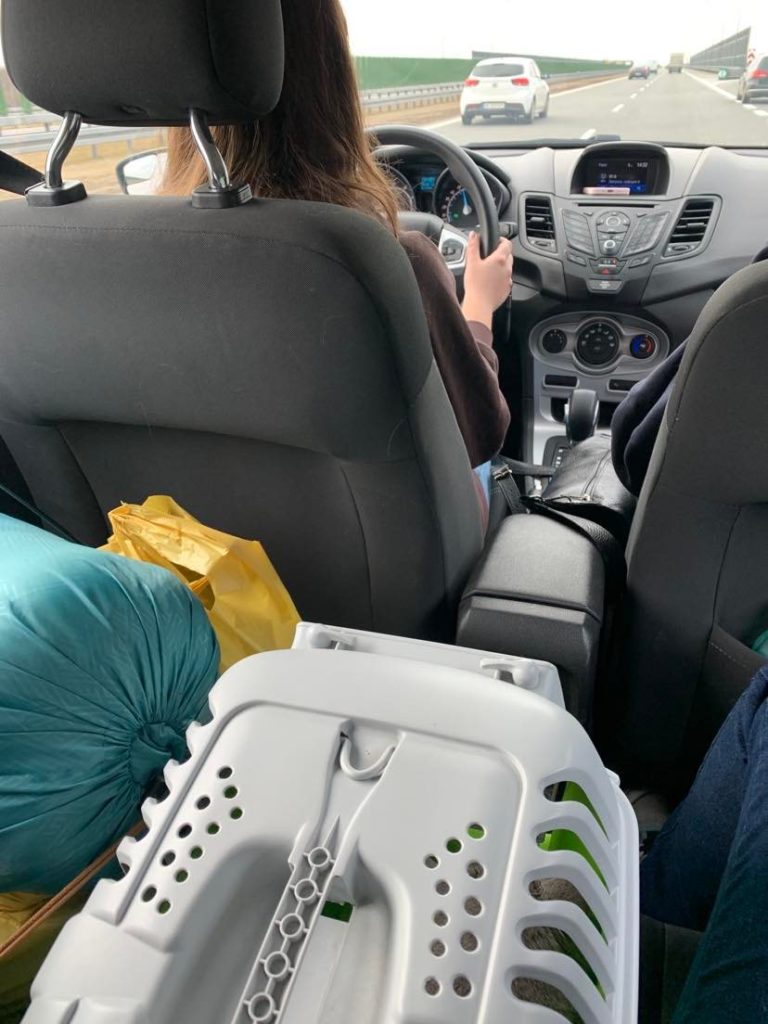
The busy road to Lviv took 18 hours by car—three times longer than it would’ve taken in peaceful times. There was no respite after reaching the city and sleeping on the mats at the local climbing hub because Hryshchenko had to say goodbye to her boyfriend. Dima asked his colleagues from Poland to help accommodate Iren and the women of the team, because Ukrainian law prevents men aged 18 to 60 from crossing the border in wartime. So 17 women and children left for the foreign country, leaving their partners behind.
The border crossing took another three days, the long checkpoint traffic jam spreading for 15 kilometers straight. “It’s not that busy now, but we had to struggle through, sleeping in cars with children and pets,” Hryshchenko recalls. For the first three days in Poland, the group stayed in Rzeszow, at the local nursing home. “We stayed with the elderly and people with disabilities. But that’s where we realized, how nice and welcoming the Poles are. They gave us everything we needed and let us stay for days,” Hryshchenko says as her voice cracks.
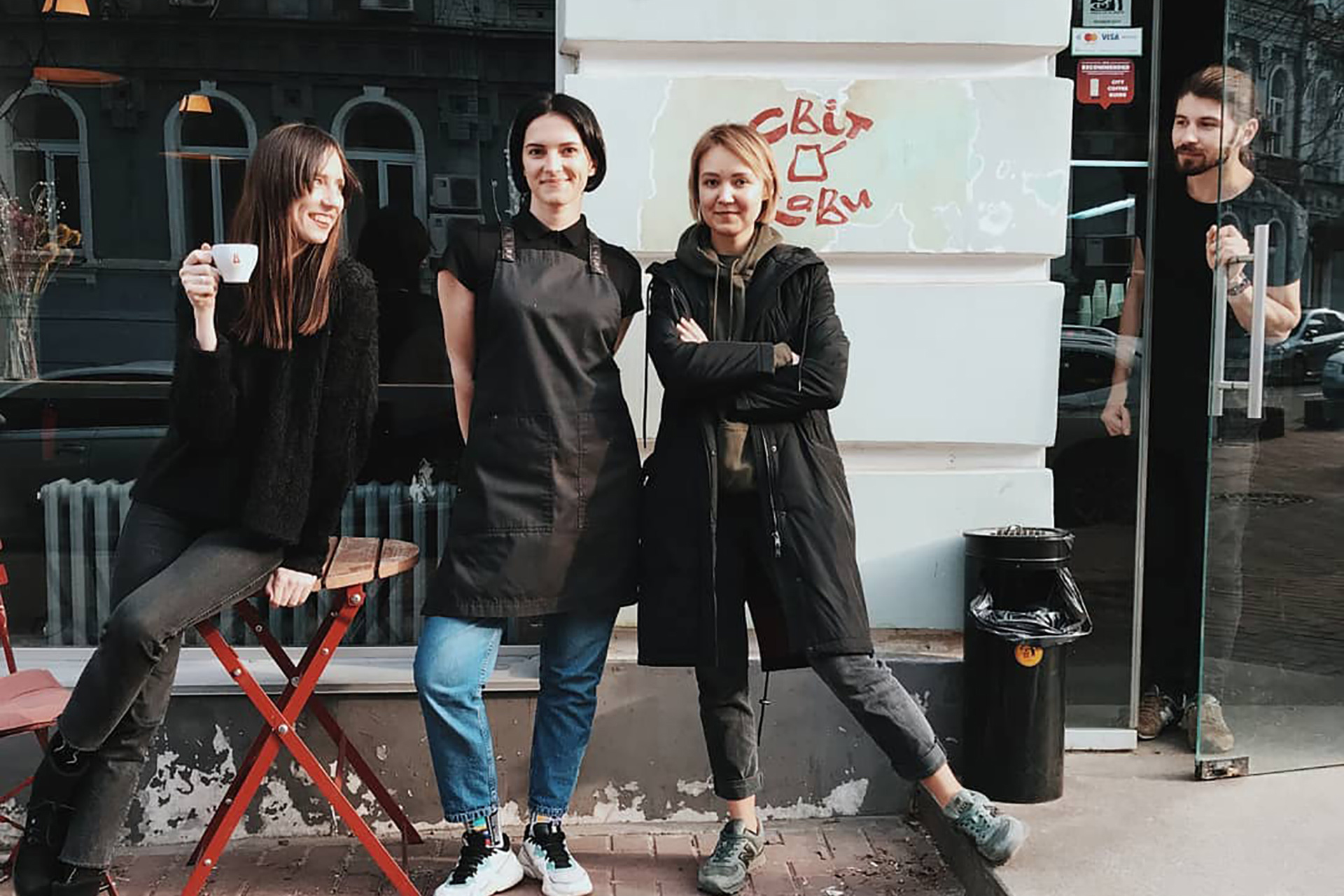
The three days in Rzeszow came and went, and so the group started to plan ahead. A few of the mountain climbing team made a run for Germany; Iren, Jah, and four other people found a place outside the city of Krakow. The new hotel accommodation worked for five days, but then it was time to head further west. Wroclaw turned out to be a better option, because there was a safe place to stay—even if it meant sleeping in the converted kiting and sporting goods store. “Once again we were so moved by the Polish people. They reorganized the whole store for us. There was no shower, but aside from that, we had everything we needed,” Hryshchenko says. “They take care not only of us but of our pets too. Jah’s got everything he needs: nourishment, even toys. It goes straight from the heart, all this gratitude tears my heart out.”
After about ten days in the kite store, she had another reason to thank the Poles. A big apartment in downtown Wroclaw became available to move to, so Hryshchenko joined another six people in the four-bedroom flat. It has been offered free of charge for the next two months. “We couldn’t believe it. The owner has been so welcoming and understanding. It helped that the Polish government set up this system that reimburses every household that hosts the Ukrainians now. We just had to file a registration form, and then it was all done officially,” Hryshchenko explains.
Today the former Kyiv barista is actively looking for a job in Wroclaw. She says it would be a dream to work in a local coffee shop, however, she’s not had luck at a few places she visited. Hryshchenko is prepared to take whatever job’s available but admits that it’s hard to concentrate on the work with the unprecedented stress of the last month. Worrying about her relatives who had to stay in Kyiv and Donetsk region doesn’t help, nor does the separation from Dima, who now volunteers in Lviv.
Hryshchenko says she’s trying to learn the new language, studying from a copy of “The Little Prince” written in Polish. Her plan is to return to Ukraine whenever possible, and not to overstay the welcome in Poland, she adds. Her colleagues at Svit Kavy got back to work after a few days off, they send her the videos from Kyiv; the city is being bombarded daily with 50% population still there. But the cafes are still open, perhaps as many as 300 by the recent Kyiv official statements.
“It feels so warm to look at the guys and the regulars,” says Hryshchenko. “I really want to go back. I Just hope there will be something to go back to.”
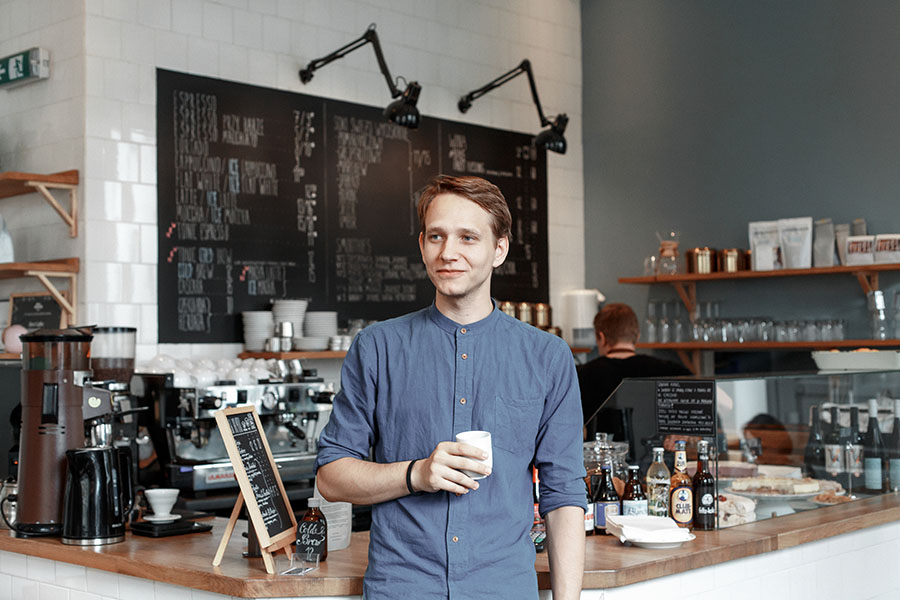
Ivan Yaremchuk is a Ukrainian barista, and for the last four years, he’s been part of the team at Warsaw’s Ministerstwo Kawy (Department of Coffee). Yaremchuk worked previously at Kyiv’s One Love Coffee and is a past Ukrainian Coffee in Good Spirits champion. He has seen firsthand the transformation of Poland’s capital into a regional refugee hub, a process that has accelerated beyond belief over the last month, but really has been underway for much of the last 2 years. “It actually started in August 2020 after the Belarus protests, we’ve seen a lot of Belarusians arriving,” says Yaremchuk. “And now Warsaw’s welcoming Ukrainians.”
Yaremchuk’s been trying to help fellow Ukrainians fleeing war, and as a Ukrainian already living in Poland, he’s in a unique position—as many as 10 individual acquaintances reached out to him after the Russian invasion started. Over the last month of strife and escape, certain patterns have emerged, says Yaremchuk. Most of the people come to Warsaw for two or three days to breathe out and head further west, he says; from there, many women and children try to continue on to places like the United Kingdom, Ireland, France, Spain, or Portugal, but the overflow of displaced people is already felt throughout Warsaw. “You can see it in public transport or just cars in the streets, it’s also hard to find an apartment in the city,” he says. “Although I don’t know a single Polish friend who hasn’t tried to help a Ukrainian.”
Ministerstwo Kawy had an opening, so head barista Yaremchuk organized for the Ukrainian Viktoriya Yaremchuk to join his team. The two share a surname, but are not related, though they did work together previously at One Love Coffee in Kyiv. “I’m just amazed that it all worked out so well for me,” says Viktoriya. “I was ready to get any job that pays in Poland, but it was great to find a barista job the day I came to the city.”
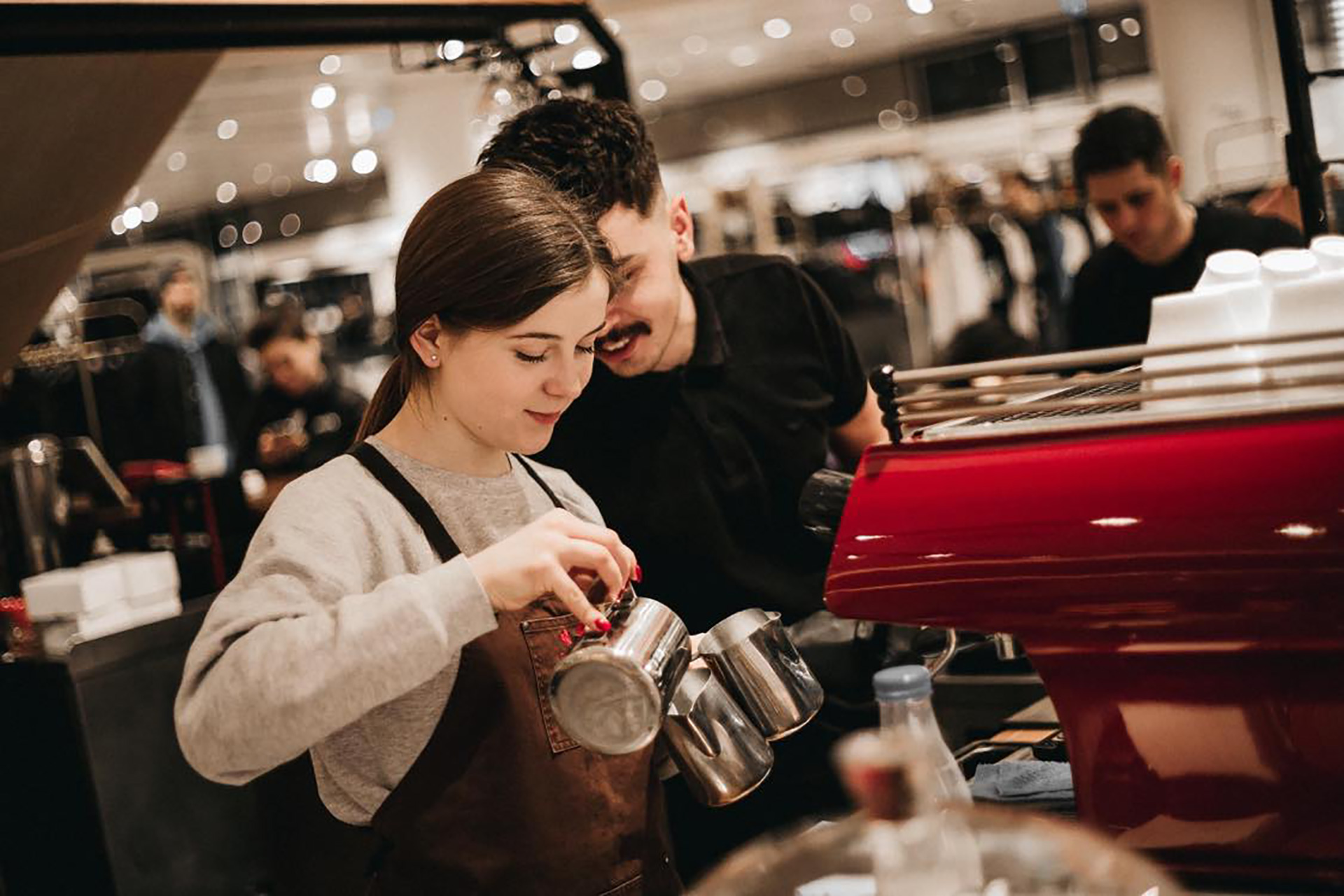
Awakened by the bomb sounds on February 24th, Viktoriya Yaremchuk went to see her parents. Just like Iren Hryshchenko, they decided Lviv was the safest destination, but while on the road they changed their mind and headed for Warsaw instead. Yaremchuk got lucky: she found a job and a place to stay in a matter of hours on the way to Poland.
Now she brews coffee at Ministerstwo Kawy, while also taking shifts at a bakery and another Warsaw coffee place, Typika. Yaremchuk says she’s happy to keep herself busy, adding that it helps that her bosses let her work separate jobs. “I can get a six-hour shift at the bakery and then work for another three hours at a coffee place. My colleagues are really nice, everyone’s really friendly and welcoming,” she says. There are also Ukrainian and Russian-speaking coworkers at all the places she works, so it’s easier to adjust to the new working conditions.
The Polish people’s desire to help was a really pleasant surprise, Yaremchuk tells me, a sentiment I’ve heard throughout reporting this story. “It’s great to get help, but what I was surprised by was that they don’t wait until you ask for help, they offer it. Just the other day me and my mom stared at our phones in public, so a man came to us and asked whether we need any help. That was so nice!” she says cheerfully.
Yaremchuk says she’s happy with the way it worked out for her in Warsaw. However, it’s hard to plan for the future: “Me and my family are staying in Poland for now, but we also keep other options in mind. What we really want though is to go back home, the sooner the better.”
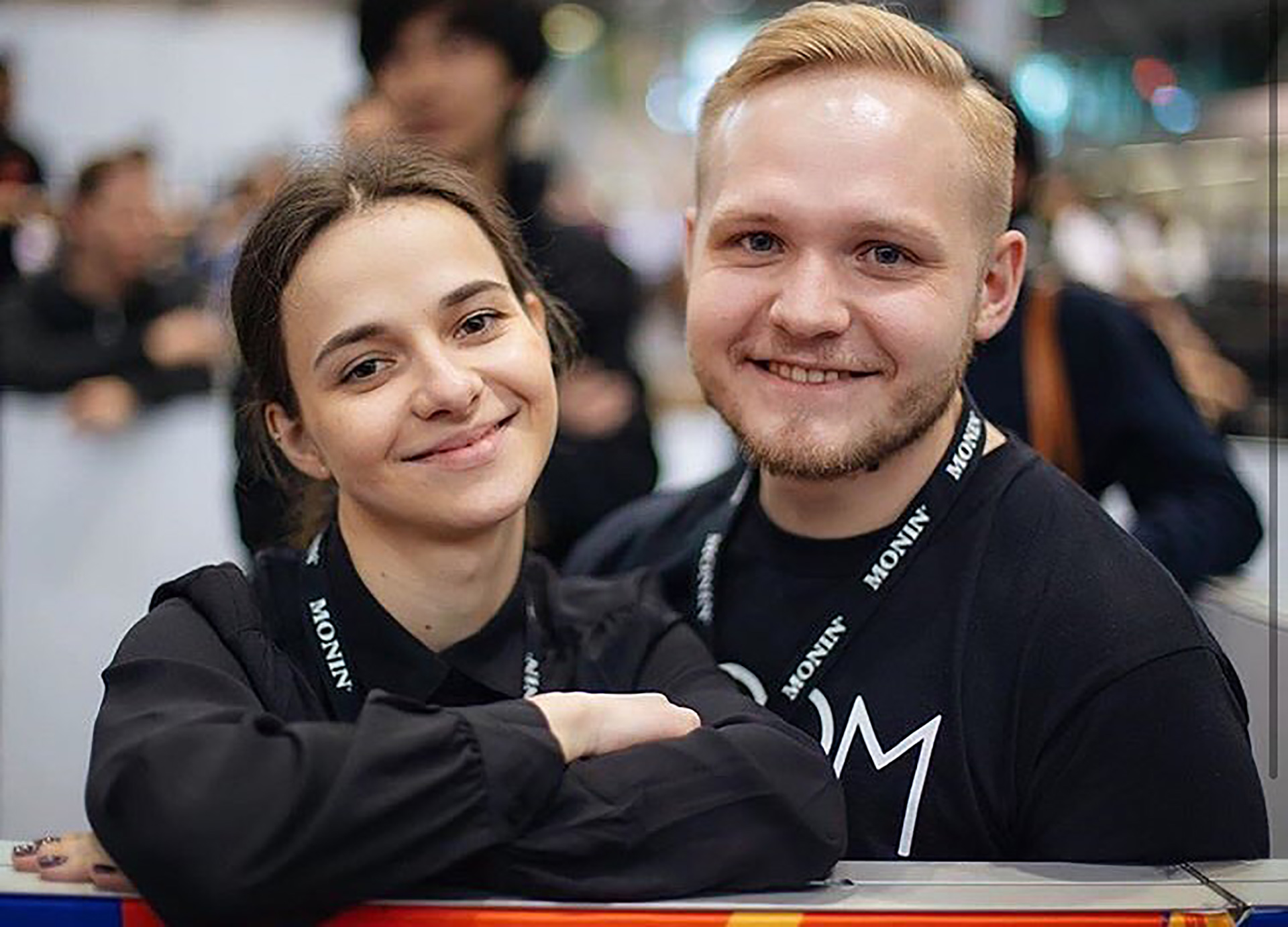
Liza Fedorovska and Olexii Fedorovskyy are something of a power couple in the Ukrainian coffee community. Olexii is the only two-time winner of the Ukrainian Brewers Cup, and Liza won the very same event herself in 2019, representing Ukraine at the 2019 World Brewers Cup in Boston. They both had to leave Kyiv after the brutal Russian invasion and completely restart their lives.
Fedorovskyy and his 3 Champs Roastery co-founders Renat Mamatkazin and Pavlo Spitsyn (both Ukrainian Barista Championship winners, hence the company name) managed to relocate to Lviv, moving their roasting equipment with them. Today they’re working to restart that business, this time in Lviv. Liza Fedorovska had to leave Ukraine for Poland, though. “For the first two days after joining my friends in Wroclaw, I just slept. I really needed to recover after a day-long trip. But then the first thought I had—I basically need to start over now,” confides Fedorovska.
On her way to Wroclaw Fedorovska filed a form distributed by SCA Poland. “They compiled this list for the Ukrainian baristas trying to find work in Europe. You could choose a city and the type of establishment you wish to work at. So I’ve chosen Wroclaw, because I had friends I could stay with there,” she explains. She got to Wroclaw on Thursday, March 3rd, and on the weekend she received a text from a local coffee shop owner. Palarnia Mala Czarna offered Fedorovska a barista job after a brief interview. “I couldn’t possibly imagine I’d get a job that quickly,” she says. “I feel blessed.”
Fedorovska works at the two Mala Czarna coffee shops and roastery, she’s also trying to brush up on her Polish. The teammates’ help and the guest’s understanding comes in handy. “I do know the basic stuff like greetings and coffee questions, but my colleagues usually tell the guests that I’m new here and that I came from Ukraine,” Liza explains. Do the guests know they’re being served by a national champion? “I believe they do,” she laughs.
Fedorovska tells me she had a lot of job offers all over Europe after the war in Ukraine reignited. “Life has a way of playing with you,” she adds. “Just a month ago I thought it would be great to work abroad, get to know different cultures. And after the invasion started I had a lot of offers. Germany, Czech Republic, Switzerland, Greece—you name it. But all I want to do now is go back to Ukraine.”
“I just didn’t want to go too far away from Ukraine. Staying in Wroclaw for now means I can go back any day, whenever needed,” she tells me. “And it can’t come soon enough!”
Yaroslav Druziuk is the Editor In Chief of Blackfield Coffee, a Ukrainian coffee culture website. Read more Yaroslav Druziuk’s for Sprudge.
